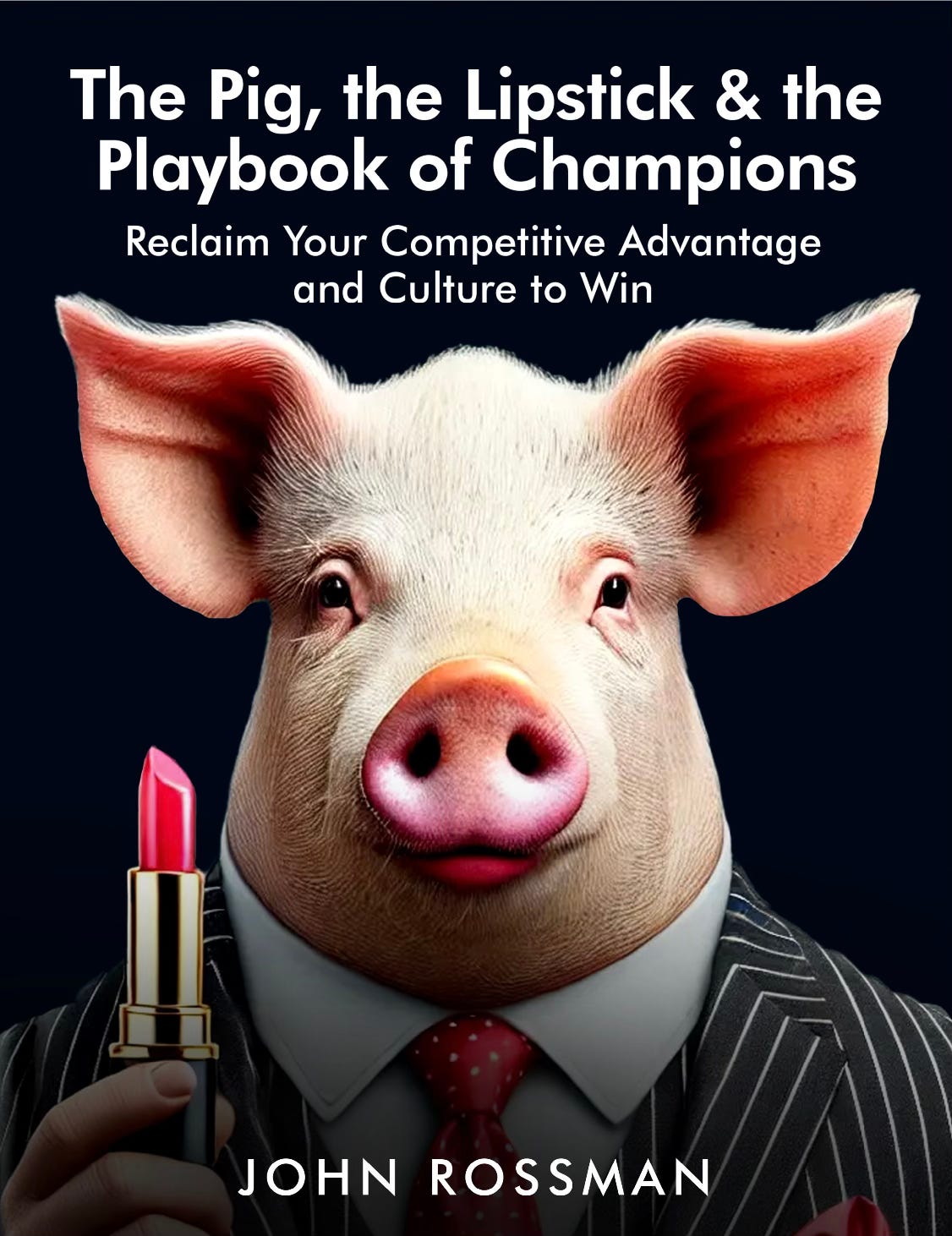Strategies and Techniques for Change Agents, Strategists, and Innovators
The greatest danger in times of turbulence is not the turbulence—it is to act with yesterday's logic — Peter Drucker
Welcome to 2025. It’s not going to predictable, business as usual, easy year. And that’s good! There is opportunity in turbulence. I wrote my free business manifesto to give a diagnosis of the situation that has seeped into many successful businesses, and a prescription to go from good to great.
I wanted to get two sharp business minds to do a deep dive into this manifesto which is designed to challenge mediocrity, reignite competitive advantage, and reshape culture for high performance. That’s precisely the journey I embarked on by inviting two leading analysts to dissect and analyze The Pig, the Lipstick, and the Playbook of Champions. Their insights promise to be as revealing as the manifesto itself, tackling everything from the innovator’s dilemma to culture hijacking, all the way to the playbook of champions.
Curious about what they uncovered? I won’t give away the ending, but I will say this: their perspectives are eye-opening, and their critiques are razor-sharp. If you’re ready to rethink the playbook for your business, your leadership, and your culture, you won’t want to miss this. Dive in, listen, and explore their analysis to see how you can apply these lessons in your own championship journey!
You can listen and/or read their analysis. Great for that RTO commute so many of us are now experiencing!
The Pig, the Lipstick and the Playbook of Champions:
Reclaim Your Competitive Advantage and Culture to Win
Note: This “analysis” was generated using Googles Notebook LM — a fascinating GenAI tool that frankly, blew my mind!
Briefing Document: The Playbook of Champions - A Framework for Business Excellence
John Rossman's "Rossman-Business-Manifesto" outlines a comprehensive approach to combating mediocrity and achieving sustained business excellence, centered around Rossman’s "Playbook of Champions" framework. This framework is not just a theoretical model; it's rooted in Rossman's experiences at Amazon and with other leading companies, providing practical guidance for organizations seeking to become leaders in their industries. Rossman presents himself as a coach and advisor, having held leadership roles and advisory roles at Amazon and other companies like T-Mobile, Microsoft, Nordstrom, and Walmart. He emphasizes the need for bold leadership and a rejection of mediocrity, aiming to help leaders make "Big Bets count to reclaim their competitive advantages."
Core Problem: The Threat of Mediocrity and "Culture Hijacking"
Rossman identifies a pervasive problem facing many established companies: the insidious spread of mediocrity. This mediocrity manifests as:
Acceptance of Average Performance: “That poison is called mediocrity, and it creates a business and team culture where being average is not just acceptable but is reinforced and rewarded. Mediocrity has become the accepted target.”
Declining Standards: A decrease in accountability, speed, and attention to detail, leading to a decline in operating standards and customer experience.
"Culture Hijacking": A shift from a mission-focused, customer-centric, high-standards culture to one driven by individual agendas and a “what does the business owe me” mentality. This results in a "victim mentality masked by bureaucracy, diluted decision-making, and weak leadership."
Complacency and Inward Focus: Past successes lead to complacency, a reluctance to take risks, and a focus on short-term gains, rather than a future-oriented approach. This leads to companies becoming inward-focused instead of outward-focused.
The "Success Trap": The tendency to defend the status quo and apply “lipstick to the pig” – masking real problems with superficial changes rather than pursuing innovation and transformation.
Contributing Factors: The Innovator's Dilemma and External Threats
Rossman also emphasizes that this internal decay is exacerbated by external factors such as:
The Innovator's Dilemma: Established companies struggle to adapt to disruptive technologies and business models, often due to a focus on incremental improvements and catering to existing customers. This makes them vulnerable to new market entrants. As Clayton Christensen defined it, "the very strategies that help companies succeed—focusing on improving existing products and catering to their best customers—can also trap them in a cycle of incremental improvements, leaving them vulnerable to disruptive technologies and business models that initially seem insignificant but eventually reshape entire industries."
Rapid Technological Change: The accelerating pace of technological advancements, particularly with the advent of AI, creates both opportunities and threats for companies that are not prepared to adapt. Rossman warns that many companies see AI as a tool for incremental improvements, rather than as a means of redefining the company’s value proposition.
Increased Competition: Companies face competitors who are moving faster, more efficiently, and with better market reaction, putting additional pressure on legacy organizations.
The Solution: The Playbook of Champions
To combat these challenges, Rossman proposes the "Playbook of Champions," a framework for achieving business excellence based on three integrated sections:
1. Section One: Building the Foundation
This section focuses on establishing a strong organizational core through the alignment of:
Purpose:Massively Transformative Purpose (MTP): A bold and visionary declaration that defines the organization's aspirational impact, serving as a "North Star" for employees, customers, and partners.
Customer Obsession: An intense and honest focus on serving customers better, ensuring market relevance, and fostering an outward focus, avoiding the pitfalls of insular thinking.
Strategy: Defining the unique and valuable position that allows the business to achieve a competitive advantage by delivering superior value to customers, connecting the MTP, target customers, and value proposition. This answers the question: "How are we going to get there?"
Principles: Clearly articulated leadership principles that guide decision-making, shape culture, and set standards for how people collaborate and innovate. Rossman highlights Amazon’s leadership principles as an example of how well-defined values can drive a business. Quoting Ray Dalio, "Operate by principles that are so clearly laid out that their logic can easily be assessed, and you and others can see if you walk the talk.”
People: A focus on thoughtful organizational design, careful hiring, training, and retention, ensuring that the right people are in the right positions. This requires a commitment to training, development, and a robust performance management system, aligned with the MTP and Principles. As Rossman notes, “People are the cornerstone of any championship organization. But it doesn’t start with hiring or positioning the right people – it starts with design.”
Key Quote from Section 1: "Culture eats strategy for breakfast," while often attributed to Peter Drucker, is only a half-truth. Rossman emphasizes, "It’s the combination of culture and strategy that sets apart the truly exceptional businesses. Culture alone doesn’t win – it’s the alignment of Purpose, Principles, and People that links a winning strategy with a high-performance execution culture and a talented team."
2. Section Two: Chasing Perfection
This section emphasizes the relentless pursuit of operational excellence and customer experience. It involves:
Staying Humble: Adopting a "learn-it-all" mindset, acknowledging room for improvement, and fostering a culture of continuous learning. Humility helps avoid the “success trap.” As Satya Nadella exemplified at Microsoft, shifting from a “know-it-all” to a “learn-it-all” culture, humility encourages curiosity, open-mindedness, and a relentless pursuit of knowledge.
Design of Metrics: Creating well-defined metrics that measure what truly matters, providing data-driven insights for improvement. "In God We Trust—All Others Must Bring Data" is an ideal Rossman highlights. He emphasizes the need to analyze root causes and act upon the data generated.
Design the Machine That Makes the Machine: Prioritizing the design of efficient workflows and implementing technology to automate processes and generate insights through work design and technology enablement. The goal is to create scalable, repeatable, efficient, and precise actions, building a system that consistently delivers results. He says “Organizations often falter because they focus too much on hustling and highly-variable approaches, versus a designed and consistent system creating the result.” This includes digitizing core processes, enabling data-driven decision-making, and integrating AI and automation. This requires data collection across the enterprise and beyond. Data is the fuel required to apply AI and automation.
Key Quote from Section 2: “Chasing Perfection is not a destination; it’s a discipline—a relentless, iterative journey of refinement and learning.”
3. Section Three: Taking Big Bets
This section focuses on the importance of strategic innovation and transformational initiatives:
Establishing Three Key Habits of Big Bet Leaders:Create Clarity: Deeply understanding customer needs, defining a clear vision, and identifying sources of ambiguity and risk.
Maintain Velocity: Prioritizing speed and rapid learning over bureaucracy.
Prioritize Risk and Value: Concentrating efforts on high-risk, high-reward initiatives.
Establish a Portfolio of Concepts: Explore a diverse range of strategic opportunities, testing and refining concepts before committing significant resources to any single idea.
Reinvention and AI: Reimagine value propositions through the lens of artificial intelligence and other disruptive technologies, pushing beyond conventional boundaries.
Experimentation: Fostering a culture of testing critical assumptions, iterating rapidly, and validating concepts early and cheaply through High Return on Experimentation (ROE) management practices. This requires strategic patience with tactical impatience.
Calculated Risks: Embracing bold moves and strategic decisions based on analysis, experimentation, and foresight, recognizing that significant change may require a fundamental shift in direction and business practices. Leaders must prioritize initiatives that promise high-impact results while fully preparing to pivot or abandon paths that don’t meet expectations.
Key Quote from Section 3: “Big Bets represent a strategic approach where organizations commit to high-ambition innovations, transformations, and growth initiatives, leveraging disruptive technologies to achieve transformative impact. These initiatives go beyond incremental improvements, aiming to radically shift the organization’s trajectory and market position.”
Who is this Playbook For?
Rossman makes it clear that the "Playbook of Champions" is not for every organization. It's for those seeking to achieve more than average performance. This is a deliberate and important choice. As Rossman states, "The choice to pursue championships is a deliberate and important choice...But if the choice you make is to have your business, team and career defined by championships, then the Playbook of Champions puts you in position to compete for them."
The Playbook is designed for organizations that:
Are ambitious and want to pursue excellence.
Are willing to make bold changes and accept calculated risks.
Set very high standards and reject mediocrity.
Have a long-term focus rather than short-term optimization.
Conclusion:
The "Playbook of Champions" provides a holistic and actionable framework for organizations to combat mediocrity, embrace change, and pursue sustained business excellence. By focusing on building a strong foundation, chasing operational perfection, and taking calculated risks with strategic innovation, organizations can create a culture that is both high-performing today and prepared for the challenges of tomorrow. It demands hard work, a willingness to challenge the status quo, and a relentless pursuit of a shared mission. Rossman’s work emphasizes that complacency and a focus on short-term wins will ultimately lead to business decline. The choice to pursue excellence is not easy, but for organizations that aspire to be champions, the framework he provides offers a roadmap for success.
Please share this free post with your team.
Onward!
John
About The Digital Leader Newsletter
This is a newsletter for change agents, strategists, and innovators. The Digital Leader Newsletter is a weekly coaching session focusing on customer-centricity, innovation, and strategy. We deliver practical theory, examples, tools, and techniques to help you build better strategies, better plans, and better solutions — but most of all, to think and communicate better.
John Rossman is a keynote speaker and advisor on leadership and innovation. Learn more at www.johnrossman.com.








Share this post